新教材外研版高中英语必修第二册全册课后练习及单元测验含解析
外研版高中英语必修第二册课后习题 Unit 1 Food for thought 第一单元测评卷
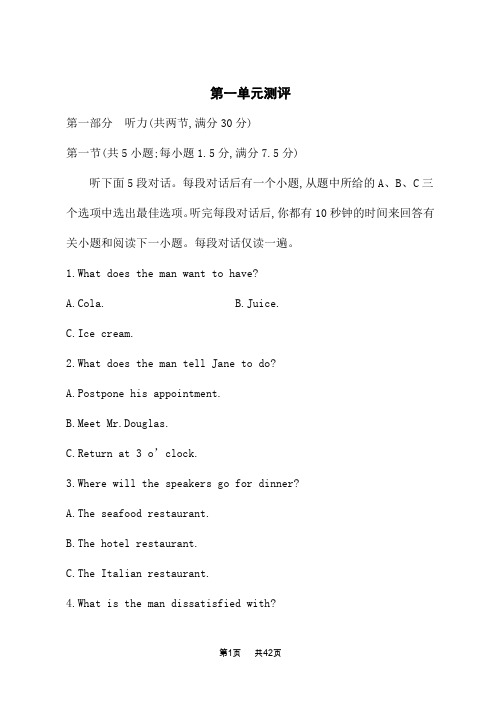
第一单元测评第一部分听力(共两节,满分30分)第一节(共5小题;每小题1.5分,满分7.5分)听下面5段对话。
每段对话后有一个小题,从题中所给的A、B、C三个选项中选出最佳选项。
听完每段对话后,你都有10秒钟的时间来回答有关小题和阅读下一小题。
每段对话仅读一遍。
1.What does the man want to have?A.Cola.B.Juice.C.Ice cream.2.What does the man tell Jane to do?A.Postpone his appointment.B.Meet Mr.Douglas.C.Return at 3 o’clock.3.Where will the speakers go for dinner?A.The seafood restaurant.B.The hotel restaurant.C.The Italian restaurant.4.What is the man dissatisfied with?A.The food.B.The service.C.The music.5.What does the woman want to do?A.Watch TV.B.Go for a walk.C.Access the Internet.第二节(共15小题;每小题1.5分,满分22.5分)听下面5段对话或独白。
每段对话或独白后有几个小题,从题中所给的A、B、C三个选项中选出最佳选项。
听每段对话或独白前,你将有时间阅读各个小题,每小题5秒钟;听完后,各小题将给出5秒钟的作答时间。
每段对话或独白读两遍。
听第6段材料,回答第6、7题。
6.What will the woman do on Saturday?A.Go to the supermarket.B.Go to a meeting.C.Show her sister around.7.What is the woman doing?A.She is cooking.B.She is reading.C.She is watching TV.听第7段材料,回答第8至10题。
外研版高中英语必修二单元测试题全套及答案.doc
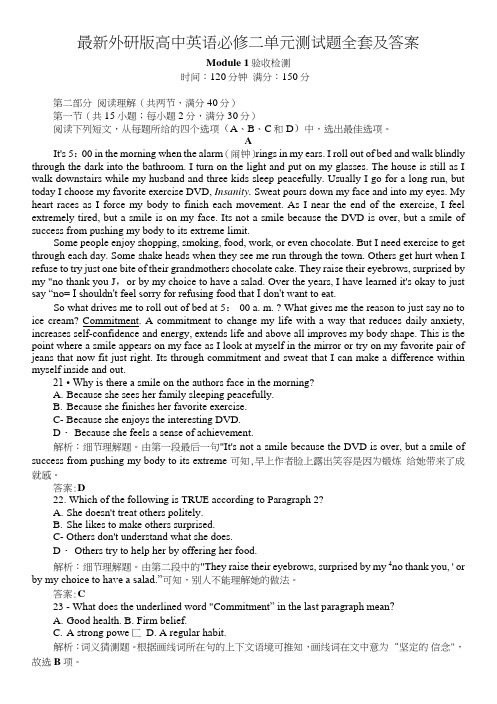
最新外研版高中英语必修二单元测试题全套及答案Module 1验收检测时间:120分钟满分:150分第二部分阅读理解(共两节,满分40分)第一节(共15小题;每小题2分,满分30分)阅读下列短文,从每题所给的四个选项(A、B、C和D)中,选出最佳选项。
AIt's 5: 00 in the morning when the alarm (闹钟)rings in my ears. I roll out of bed and walk blindly through the dark into the bathroom. I turn on the light and put on my glasses. The house is still as I walk downstairs while my husband and three kids sleep peacefully. Usually I go for a long run, but today I choose my favorite exercise DVD, Insanity. Sweat pours down my face and into my eyes. My heart races as I force my body to finish each movement. As I near the end of the exercise, I feel extremely tired, but a smile is on my face. Its not a smile because the DVD is over, but a smile of success from pushing my body to its extreme limit.Some people enjoy shopping, smoking, food, work, or even chocolate. But I need exercise to get through each day. Some shake heads when they see me run through the town. Others get hurt when I refuse to try just one bite of their grandmothers chocolate cake. They raise their eyebrows, surprised by my "no thank you J,or by my choice to have a salad. Over the years, I have learned it's okay to just say “no= I shouldn't feel sorry for refusing food that I don't want to eat.So what drives me to roll out of bed at 5: 00 a. m. ? What gives me the reason to just say no to ice cream? Commitment. A commitment to change my life with a way that reduces daily anxiety, increases self-confidence and energy, extends life and above all improves my body shape. This is the point where a smile appears on my face as I look at myself in the mirror or try on my favorite pair of jeans that now fit just right. Its through commitment and sweat that I can make a difference within myself inside and out.21 • Why is there a smile on the authors face in the morning?A.Because she sees her family sleeping peacefully.B.Because she finishes her favorite exercise.C- Because she enjoys the interesting DVD.D・ Because she feels a sense of achievement.解析:细节理解题。
新教材 外研版高中英语必修第二册全册各单元知识点提炼汇总(单词短语句型语法等详解及扩展)
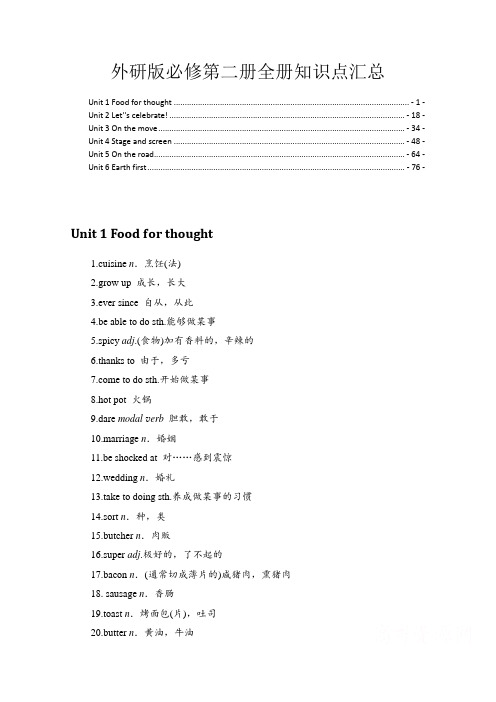
外研版必修第二册全册知识点汇总Unit 1 Food for thought ........................................................................................................... - 1 - Unit 2 Let''s celebrate! ........................................................................................................... - 18 - Unit 3 On the move ................................................................................................................ - 34 - Unit 4 Stage and screen ......................................................................................................... - 48 - Unit 5 On the road .................................................................................................................. - 64 - Unit 6 Earth first ..................................................................................................................... - 76 -Unit 1 Food for thought1.cuisine n.烹饪(法)2.grow up 成长,长大3.ever since 自从,从此4.be able to do sth.能够做某事5.spicy adj.(食物)加有香料的,辛辣的6.thanks to 由于,多亏e to do sth.开始做某事8.hot pot 火锅9.dare modal v erb胆敢,敢于10.marriage n.婚姻11.be shocked at 对……感到震惊12.wedding n.婚礼13.take to doing sth.养成做某事的习惯14.sort n.种,类15.butcher n.肉贩16.super adj.极好的,了不起的17.bacon n.(通常切成薄片的)咸猪肉,熏猪肉18.sausage n.香肠19.toast n.烤面包(片),吐司20.butter n.黄油,牛油21.get sb./sth.into...使某人/某物进入……22.typical adj.典型的,有代表性的23.had better (not) do sth.最好(不)做某事24.suffer v.(身体或精神上)受苦※suffer from 遭受……之苦25.according to 按照,根据26.encourage sb.to do sth.鼓励某人做某事27.deal with 应付,处理e across 偶遇,偶然发现29.stinky adj.难闻的,有臭味的30.tofu n.豆腐31.horrible adj.糟糕的32.gather v.聚集33.bite n.咬※take/have a bite 咬一口34.remind sb.of...使某人想起……35.cheese n.干酪,奶酪36.fall in love with 爱上,喜欢37.someday 将来有一天,有朝一日38.poison n.毒素,毒物,毒药39.feel at home with 对……感到舒适自在40.cross-cultural adj.跨文化的41.oolong n.乌龙茶42.china n.瓷,瓷料Words and Phrases知识要点1diet n.日常饮食vi.按照医生的规定饮食(教材P5)If you d are not try a “painful” diet to stay healthy,this new app is the perfect solution—and you needn't pay for it!如果你为了健康而不敢尝试一种“痛苦的”饮食,这个应用程序就是完美的解决方案——而且你不必付钱![例1]Everyone should try to reduce the amount of salt in our diet.大家都应该在饮食中减少盐的摄入量。
新教材 外研版高中英语必修第二册全册课后练习及单元测验 含解析

外研版高中英语必修第二册全册课后习题及单元测验Unit 1 Food for thought ........................................................................................................... - 2 - 课时作业1 ...................................................................................................................... - 2 - 课时作业2 ...................................................................................................................... - 7 - 课时作业3 .................................................................................................................... - 11 - 单元综合检测................................................................................................................ - 17 - Unit 2 Let''s celebrate! ........................................................................................................... - 32 - 课时作业1 .................................................................................................................... - 32 - 课时作业2 .................................................................................................................... - 38 - 课时作业3 .................................................................................................................... - 42 - 单元综合检测................................................................................................................ - 47 - Unit 3 On the move................................................................................................................ - 62 - 课时作业1 .................................................................................................................... - 62 - 课时作业2 .................................................................................................................... - 68 - 课时作业3 .................................................................................................................... - 73 - 单元综合检测................................................................................................................ - 78 - Unit 4 Stage and screen ......................................................................................................... - 95 - 课时作业1 .................................................................................................................... - 95 - 课时作业2 .................................................................................................................. - 101 - 课时作业3 .................................................................................................................. - 106 - 单元综合检测.............................................................................................................. - 111 - Unit 5 On the road................................................................................................................ - 127 - 课时作业1 .................................................................................................................. - 127 - 课时作业2 .................................................................................................................. - 133 - 课时作业3 .................................................................................................................. - 137 - 单元综合检测.............................................................................................................. - 143 - Unit 6 Earth first ................................................................................................................... - 158 - 课时作业1 .................................................................................................................. - 158 - 课时作业2 .................................................................................................................. - 164 - 课时作业3 .................................................................................................................. - 168 - 单元综合检测.............................................................................................................. - 173 -Unit 1 Food for thought课时作业1Ⅰ.单词拼写1.The dog is so fierce that he dare(敢) not come near it.2.A snack(小吃,点心) in the afternoon bridges the gap between lunch and supper.3.What sort(种,类)of music do you like?4.In the eyes of the Miao,the dragon is a symbol(象征) of good luck.5.The woman she acted in the film is typical(典型的) of the women in the 1930s.6.We had a super(极好的)meal there.7.Can you all gather(聚集)round?I have something to tell you.8.Could you give me your honest opinion(意见,看法) of the book?9.The food was analyzed and found to contain small amounts of poison(毒素).10.He has invited all the battle companions to participate in his wedding(婚礼) party.Ⅱ.阅读理解AI know what you're thinking:Pizza?For breakfast?But the truth is that you can have last night's leftovers in the morning if you want to.I know lots of women who skip breakfast,and they have a ton of different excuses for doing it.Some say they don't have time,others think they're“saving”calories(卡路里),and still others just don't like breakfast food.But the bottom line is that eating in the morning is very important when you're trying to lose weight.“Eating just about anything from 300 to 400 calories would be better than nothing at all,”says Katherine Brooking,R.D.,who developed the supereasy eating plan for this year's“SELF CHALLENGE”.And even pizza can be healthy if it's loaded with vegetables,and you stick to one small piece.Breakfast is one meal I never miss,and the same goes for most weight loss success stories.Research shows that eating breakfast keeps you from overeating later in the day.Researchers at the University of Southern California found that breakfast skippershave a bigger chance of gaining weight than those who regularly have a morning meal.So eat something in the morning,anything.I know plenty of friends who end up having no breakfast altogether,and have just coffee or orange juice.I say,try heating up last night's leftovers-it may sound crazy,but if it works for you,do it!I find if I tell myself,“You can always eat it tomorrow,”I put away the leftovers instead of eating more that night.Try it.You may save yourself some prebedtime calories.And watch your body gain the fat-burning effects.【语篇解读】正在减肥的人们到底应不应该吃早餐?本文说明了吃早餐的重要性。
(外研版)高中英语必修第二册Unit4单元测试02含答案解析

加油!有志者事竟成答卷时应注意事项1、拿到试卷,要认真仔细的先填好自己的考生信息。
2、拿到试卷不要提笔就写,先大致的浏览一遍,有多少大题,每个大题里有几个小题,有什么题型,哪些容易,哪些难,做到心里有底;3、审题,每个题目都要多读几遍,不仅要读大题,还要读小题,不放过每一个字,遇到暂时弄不懂题意的题目,手指点读,多读几遍题目,就能理解题意了;容易混乱的地方也应该多读几遍,比如从小到大,从左到右这样的题;4、每个题目做完了以后,把自己的手从试卷上完全移开,好好的看看有没有被自己的手臂挡住而遗漏的题;试卷第1页和第2页上下衔接的地方一定要注意,仔细看看有没有遗漏的小题;5、中途遇到真的解决不了的难题,注意安排好时间,先把后面会做的做完,再来重新读题,结合平时课堂上所学的知识,解答难题;一定要镇定,不能因此慌了手脚,影响下面的答题;6、卷面要清洁,字迹要清工整,非常重要;7、做完的试卷要检查,这样可以发现刚才可能留下的错误或是可以检查是否有漏题,检查的时候,用手指点读题目,不要管自己的答案,重新分析题意,所有计算题重新计算,判断题重新判断,填空题重新填空,之后把检查的结果与先前做的结果进行对比分析。
亲爱的朋友,你们好!经过两个月的学习,你们一定有不小的收获吧,用你的自信和智慧,认真答题,相信你一定会闯关成功。
相信你是最棒的!Unit 4单元测试Ⅰ. 阅读理解(共15小题;每小题2.5分,满分37.5分)ACREATIVE KIDS FILM MAKING◆Become a director, scriptwriter(编剧), editor(编辑)and more all in a week?◆Six and a half days of film making +six and a half days of fun activities.What’s it all about?Imagine yourself as the new Steven Spielberg or Ridley Scott? Love the cinema, but think you could do better? Or do you dream of being the next Keira Knightley or Johnny Depp? If so, then this is your holiday! You and your group will choose the type of film to make — adventure, fantasy, thriller or comedy. Then you’ll create your own film to show at the end of the week. What’s more, you’ll also take your film home on DVD too!Can I do other activities as well?Yes — every day there’s also half a day of activities from our great activity programme, and different entertainment every evening. So you can pack in lots of other new experiences too!What do I learn?You’ll learn the basics of film and sound recording, performing, and scriptwriting; and how to use sound effects, visual effects and music.You’ll also learn about the work of a director, before editing your own film.Do I need any experience?No, our fantastic trained instructors and film industry experts will guide you through the whole process, and give you tips from the professionals.Do I need any specialist equipment?No, we’ll provide all the equipment, from top spec digital video cameras and editing equipment, to costumes and makeup. Just bring your imagination!Only £695 per child!1. Why are the big names mentioned?A. To make the course attractive.B. To show they are really great.C. To show the popularity of films.D. To introduce the course’s teachers.2. What will the kids do in the evening?A. Show their films.B. Enjoy themselves.C. Learn how to make films.D. Take part in outdoor activities.3. The kids who want to have the course are expected to ________.A. wear makeupB. bring camerasC. be filmloversD. be experiencedBCoffee is an important part of Italian culture and since arriving here over six months ago, I have drunk a lot of it!Of course, coffee is also very popular in the UK but coffee culture in Italy is a completely different story. In Italy, when you order a coffee in a cafe or bar(酒吧), you are served with a tiny, bitter espresso. This is “normal(正常的)coffee” for Italians and they are not so interested in the huge coffees that we drink in the UK. If you want more than one sip(小口)of coffee in Italy, lungo is a good choice. It is espresso with a little more water added, but still served in a small cup. In addition, while takeaway coffee is quite popular among Brits, it is not very common at all in Italy, especially in nontouristy areas. Generally, Italians prefer to drink their tiny coffees while standing at the bar and, for many, this short break is an important part of their day.Usually, breakfast in a bar in Italy includes a coffee and a pastry(酥皮糕点). I have been spoiled for choice with lovely cafés in the Italian town I’m living in. These cafés sell different kinds of mouth watering pastries — either plain(无馅料的)or filled with cream, chocolate, etc. —as well as delicious coffee. Cappuccinos are very popular at breakfast time and, for me, a creamy cappuccino and a pastry with chocolate is the perfect way to start the day.Finally, I have found that coffee in Italy is so much cheaper than coffee in the UK. Normally, an espresso or a macchiato(an espresso with a drop of milk)costs around one euro and a cappuccino about 1.50! They are small,of course, but this means that in Italy it is possible to go out for coffee every day without breaking the bank.4. How is Paragraph 2 mainly developed?A. By time.B. By space.C. By example.D. By comparison.5. Which coffee will you get in Italy if you order one without special instructions?A. Espresso.B. Lungo.C. Cappuccino.D. Macchiato.6. What can we learn about the coffee culture in Italy?A. Takeaway coffee is very popular among Italians.B. Italians are very often seen drinking huge coffees.C. Italians like to take short breaks from work for coffee.D. Coffees are often served along with pastries during breakfasts.7. What does the author think of Italian coffee?A. She loves its bitter taste.B. It is too expensive for her.C. It is a good choice for breakfast.D. The cup it is served in is too small.CWhat makes you happy? Music? Money? Spending time with friends?For American young people, family time is the main source(来源)of happiness, according to a recent survey (调查)of 1,280 American young people. Most of them say it is a good relationship with their parents that makes them happy.“My mum tells me that, even if I do something silly, she’s still going to love me no matter what happens. Just knowing that makes me feel very happy.” says Kristiana St.John, 17, a high school student in New York.After family, it is relationships with friends that seem to matter most.There were also many other kinds of answers given to the “What makes you happy?” question. For Chad Fiedler, 17, happiness is “just waking up in the morning and looking forward to what he’s going to do that day”.And for Esohe Roland, 14, it’s “playing the trumpet(小号)in his school band”. So, what is happiness? Let’s hear what Chinese teenagers want to say.For Bao Yiqiao, 15, Beijing, happiness comes from success brought by hard work. She felt happy when she was admitted to a top high school. She was happy when she came fifth in a recent swimming competition.For Jiang Wenyu, 17, Dalian, spending time with his family makes him happy. Whenever he feels down at school,his parents encourage him to go on. They always help him to find a way out.8. ________ matters most for American young people.A. Having a lot of moneyB. Enjoying musicC. Good relationships with their friendsD. A good relationship with their parents9. Which of the following might make Bao Yiqiao happy?A. Getting on well with her parents.B. Playing computer games all day.C. Taking the 2nd place in the table tennis competition.D. Offering others timely help.10. We can learn from the passage that _________.A. Kristiana St. John often does silly thingsB. Esohe Roland is fond of playing the guitarC. Chad Fiedler feels happy when looking forward to the futureD. Jiang Wenyu’s parents never help him with his lessons11. It can be inferred from the passage that _________.A. the Americans don’t believe hard work can lead to successB. the Chinese children don’t have a good relationship with their parentsC. the Chinese and the Americans share the same ideas of happinessD. different people have different ideas of happinessDFrom high definition(HD)TV to 3D TV, if we asked our screens to produce lifelike and realistic pictures, that is certainly what we got. As the 3D TV revolution picks up pace, it’s time to stop studying the technology itself and to start seeing exactly how we, as television fans, can benefit from it, and how it will change our viewing experience.It is true that what you’ve got is good if you don’t know what you’re missing out on; in other words, if you’re living with a perfectly common television, which has on HD capabilities, the chances are that you’re not hoping for HD TV and that your picture looks as clear as you need it to be. But as soon as you try HD TV, you’ll be amazed at the difference it makes to your viewing pleasure and the same is true of 3D TV.3D TVs are rapidly becoming as common as other TVs on goods shelves(货架)of retailers and in the homes of people across the UK. And as the technology develops, the picture becomes clearer, sharper and more real. Television shows that look particularly good in 3D are sports, nature programs and those that are exciting and full of special effects, and lovers of these are in for a real treat when they buy a 3D TV.More and more football matches are shown on 3D TV, and those fans who have experienced a 3D football match compare it to being there in person. The same is true of nature programs, particularly those that feature brightly colored animals and plants, the details of which are quite realistic when viewed on 3D TV.Exciting films have always lent themselves to 3D technology, with dinosaurs surrounding you in your own living room and so on—it can be a frighteningly realistic experience for viewers!12. Some people are happy with perfectly common televisions because _________.A. they don’t know the benefits of HD TV and 3D TVB. their common televisions are very expensiveC. they don’t have enough money to buy HD TV or 3D TVD. their televisions must have some HD capabilities13. What does the underlined word “retailers” in Paragraph 3 probably mean?A. People who study HD television.B. Businessmen who sell goods to consumers.C. People who are ready to buy something.D. Places where a lot of goods are stored.14. What television programs look particularly good on 3D TV?A. Sports programs and nature programs.B. Music programs and education programs.C. Education programs and nature programs.D. Art programs and writing programs.15. This text is written mainly to tell readers _________.A. the difference between HD TV and 3D TVB. there is a need to buy HD TV or 3D TVC. the rapid development of technologyD. 3D TV gives viewers a realistic experienceⅡ. 阅读七选五(共5小题;每小题2.5分,满分12.5分)Movies have documented America for more than one hundred years. Since Thomas Edison introduced the movie camera in 1893, amateur and professional moviemakers have used moving pictures to tell stories and explain the work of business and government. 16 By preserving these movies, we will save a century of history.Unfortunately, movies are not made to last. 17 Already the losses are high. Only 20% of US feature films from the 1910s to 1920s survive. Of the American features produced before 1950, about half exist. For independently produced works, we have no way of knowing how much has been lost.For many libraries and museums, the hardest step in preserving movie collections is getting started. The Movie Preservation Guide is designed for these organizations. 18 These institutions have collections of moving pictures but lack information about how to take care of them. The Guide contains basic facts for “beginners” —professionals trained in history but unschooled in this technical area.The Guide grew from user workshops at Duke University. At the sessions, beginners talked with technical experts about what they needed to know to preserve and make available their movie collections. 19 Following the advice, the Guide describes methods for handling and storing moving pictures that are practical for research institutions with limited resources. 20 The Guide has been translated into Chinese, Japanese and Korean.A. “Keep it simple!” was the advice of the discussions.B. They’ll be damaged within years if not properly stored.C. These organizations are the first to save American movies.D. It is organized in chapters and includes case studies and charts.E. It introduces movie preservation to nonprofit and public institutions.F. They show how generations of Americans have lived, worked and dreamed.G. They store the original movies and new ones under coolanddry conditions.Ⅲ. 完形填空(共15小题;每小题1分,满分15分)Have you ever been caught in difficulties? Remember that selfconfidence is 21 than a knife. You can use it to fight a challenge. Read the short story below to 22 the power of selfconfidence.A man was trying to find his way 23 a dark cave with a light of hope from a lantern(灯笼).Finally, he could see some sunlight in the cave, which made him 24 .But as he drew closer, he was 25 to see a big rock standing before him.He pushed the rock, but it stood there firmly without 26 even a little. He tried again, but it prevented him from 27 the place. The man felt as if being swallowed by a whale that was waiting to enjoy his supper. He sat 28 the big rock in the mouth of the dark cave looking back on his adventure. He had overcome many difficulties and 29 he would overcome this one, too.So he said to himself with confidence, “I will 30 here.” He encouraged himself and it added to his power and gave him more 31 in pushing the huge rock.The rock moved a little, which encouraged him to work 32 . Thanks to all his efforts, slowly the rock made way for him. He walked along the bright and evergreen path before him — with 33 .We all may meet difficulties in our life. Some people don’t believe they can overcome them and choose to 34 , but some choose to face them with confidence. Those who give up will 35 succeed. Only those who face difficulties with confidence will find their ways and succeed in life in the end.21. A. sharper B. faster C. larger D. nearer22. A. consider B. regain C. understand D. ask23. A. on B. through C. below D. before24. A. smile B. think C. move D. cry25. A. pleased B. surprised C. sad D. excited26. A. breaking B. refusing C. disappearing D. moving27. A. leaving B. enjoying C. destroying D. checking28. A. in the heart of B. at the foot of C. in the middle of D. on the right of29. A. doubted B. explained C. worried D. believed30. A. show up B. look around C. get out of D. make use of31. A. time B. energy C. space D. advice32. A. harder B. longer C. wider D. deeper33. A. courage B. fear C. experience D. pride34. A. look up B. give up C. catch up D. cheer up35. A. usually B. always C. sometimes D. neverⅣ. 语法填空(共10小题;每小题1.5分,满分15分)Shadow play has a long history and is 36. ________ unique kind of art form. It is performed 37. ________ sending shadows of puppets(木偶)on a piece of white cloth. The puppets made of leather(皮革)38. ________ (paint)in very bright colours, so that the shadows they make are very 39. ________ (colour).The players stand behind the cloth and move the puppets against strong light when 40. ________ (show)a shadow play, and the shadows of the puppets fall on the cloth. At the same time, the players talk or sing, telling a story with 41. ________(musician)playing the drums and other instruments, such as erhu, sanxian, sheng, etc. People on the other side of the cloth can see the shadows of the puppets do all kinds of movements. It’s just like the movie today.Shadow play started in the Han Dynasty. 42. ________ is said that Emperor Wu of Han was sad and didn’t want to do anything because one of his favourite wives died. 43. ________ (cheer)him up, his officer made a puppet like the emperor’s dead wife with leather. He moved it and made it 44. ________ (act)behind a piece of cloth. The emperor enjoyed it very much. After that, shadow play became 45. ________ (popular)known in China.Ⅴ. 应用文写作(满分15分)《新西线无战事》是一部反战电影经典力作,曾获奥斯卡最佳影片等大奖。
新教材2020外研版英语必修第二册单元检测卷(四)含答案
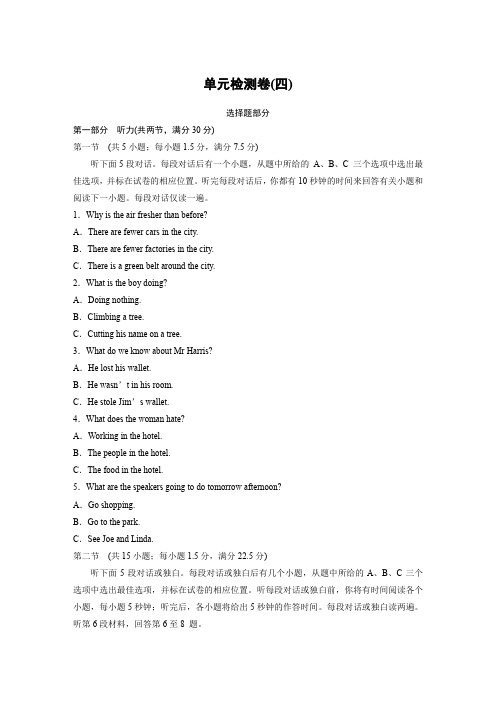
单元检测卷(四)选择题部分第一部分听力(共两节,满分30分)第一节(共5小题;每小题1.5分,满分7.5分)听下面5段对话。
每段对话后有一个小题,从题中所给的A、B、C 三个选项中选出最佳选项,并标在试卷的相应位置。
听完每段对话后,你都有10秒钟的时间来回答有关小题和阅读下一小题。
每段对话仅读一遍。
1.Why is the air fresher than before?A.There are fewer cars in the city.B.There are fewer factories in the city.C.There is a green belt around the city.2.What is the boy doing?A.Doing nothing.B.Climbing a tree.C.Cutting his name on a tree.3.What do we know about Mr Harris?A.He lost his wallet.B.He wasn’t in his room.C.He stole Jim’s wallet.4.What does the woman hate?A.Working in the hotel.B.The people in the hotel.C.The food in the hotel.5.What are the speakers going to do tomorrow afternoon?A.Go shopping.B.Go to the park.C.See Joe and Linda.第二节(共15小题;每小题1.5分,满分22.5分)听下面5段对话或独白。
每段对话或独白后有几个小题,从题中所给的A、B、C三个选项中选出最佳选项,并标在试卷的相应位置。
听每段对话或独白前,你将有时间阅读各个小题,每小题5秒钟;听完后,各小题将给出5秒钟的作答时间。
新教材外研版高中英语选择性必修第二册全册课时练习题及各单元测验 含解析
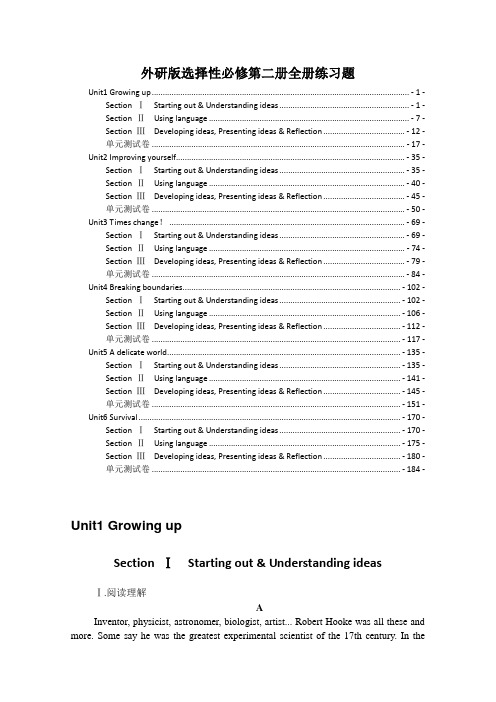
外研版选择性必修第二册全册练习题Unit1 Growing up ..................................................................................................................... - 1 - Section ⅠStarting out & Understanding ideas ........................................................... - 1 - Section ⅡUsing language ........................................................................................... - 7 - Section ⅢDeveloping ideas, Presenting ideas & Reflection ..................................... - 12 - 单元测试卷 ................................................................................................................... - 17 - Unit2 Improving yourself........................................................................................................ - 35 - Section ⅠStarting out & Understanding ideas ......................................................... - 35 - Section ⅡUsing language ......................................................................................... - 40 - Section ⅢDeveloping ideas, Presenting ideas & Reflection ..................................... - 45 - 单元测试卷 ................................................................................................................... - 50 - Unit3 Times change! ........................................................................................................... - 69 - Section ⅠStarting out & Understanding ideas ......................................................... - 69 - Section ⅡUsing language ......................................................................................... - 74 - Section ⅢDeveloping ideas, Presenting ideas & Reflection ..................................... - 79 - 单元测试卷 ................................................................................................................... - 84 - Unit4 Breaking boundaries ................................................................................................... - 102 - Section ⅠStarting out & Understanding ideas ....................................................... - 102 - Section ⅡUsing language ....................................................................................... - 106 - Section ⅢDeveloping ideas, Presenting ideas & Reflection ................................... - 112 - 单元测试卷 ................................................................................................................. - 117 - Unit5 A delicate world .......................................................................................................... - 135 - Section ⅠStarting out & Understanding ideas ....................................................... - 135 - Section ⅡUsing language ....................................................................................... - 141 - Section ⅢDeveloping ideas, Presenting ideas & Reflection ................................... - 145 - 单元测试卷 ................................................................................................................. - 151 - Unit6 Survival ....................................................................................................................... - 170 - Section ⅠStarting out & Understanding ideas ....................................................... - 170 - Section ⅡUsing language ....................................................................................... - 175 - Section ⅢDeveloping ideas, Presenting ideas & Reflection ................................... - 180 - 单元测试卷 ................................................................................................................. - 184 -Unit1 Growing upSection ⅠStarting out & Understanding ideasⅠ.阅读理解AInventor, physicist, astronomer, biologist, artist... Robert Hooke was all these and more. Some say he was the greatest experimental scientist of the 17th century. In thecourse of his work, he cooperated with famous men of science like Isaac Newton, and the great architect Christopher Wren.Hooke's early education began at home, under the guidance of his father. He entered Westminster School and from there he went to Oxford, where he came in contact with some of the best scientists in England. Hooke impressed them with his skills at designing experiments and inventing instruments. In 1662, he was named Curator of Experiments at the newly formed Royal Society of London — meaning that he was responsible for demonstrating (展示) new experiments at the society's weekly meetings. Hooke accepted the job, even though he knew that the society had no money to pay him!Watching living things through a microscope was one of his favourite pastimes. He invented a compound microscope for this purpose. One day while observing a cork (软木塞) under a microscope, he saw honeycomb-like structures. There were cells —the smallest units of life. In fact, it was Hooke who invented the term “cell” as the box-like cells of the cork reminded him of the cells of some place.Another achievement of Hooke's was his book Micrographia, which introduced the enormous potential of the microscope. It contains fascinating drawings of the things he saw under the microscope. The book also includes, among other things, ideas on gravity, light and combustion (燃烧) that may have helped scientists like Newton when they were developing their own theories on these phenomena.Hooke made a valuable contribution to astronomy, too. A crater (坑) on the moon is named after him in honour of his services to this branch of science.1.Why did Hooke accept the job as Curator of Experiments?A.He was good at designing experiments.B.His family needed his support.C.He wanted to please the famous scientists in England.D.His parents couldn't afford his education.2.What does the underlined word “pastimes” in Paragraph 3 mean?A.Jobs. B.Experiments.C.Hobbies. D.Structures.3.What can we learn from the text?A.Hooke went to Oxford in 1662.B.Hooke was well paid in the Royal Society of London.C.Hooke made a contribution to medicine.D.Hooke's book Micrographia might have helped Newton.4.What is the last paragraph to prove?A.Hooke was the greatest experimental scientist of the 17th century.B.Hooke was good at making discoveries.C.Hooke's contributions were not limited to one field.D.Hooke was one of the greatest astronomers.BParents often put their own relationship on the back burner to concentrate on their children, but a new study shows that when spouses (配偶) love each other, their children stay in school longer and marry later in life.Research about how the affection between parents shapes their children's long-term life outcomes is rare because the data demands are high. This study uses unique data from families in Nepal to provide new evidence. The study, co-authored by researchers at the University of Michigan and McGill University in Quebec, was published in the journal Demography.“In this study, we see that parents' emotional connection to each ot her affects child growth so much that it shapes their children's future,” said coauthor and UM Institute for Social Research researcher William Axinn. “The fact that we found these kinds of things in Nepal moves us to step closer to evidence that these things are universal.”The study uses data from the Chitwan Valley Family Study in Nepal. The survey was launched in 1995, and collected information from 151 neighborhoods in the Western Chitwan Valley. Married couples were interviewed at the same time but separately, and were asked to assess the level of affection they had for their partner. The spouses answered “How much do you love your husband/wife, very much, some, a little, or not at all?”The researchers then followed the children of these parents for 12 years to document their education and marital (婚姻的) behavior. They found that the children of the parents who reported they loved each other either “some” or “very much” stayed in school longer and married later.“Family isn't just another institution. It's not like a school. It is this place where we also have emotions and feelings,” said lead author Sarah Brauner-Otto, director of the Centre on Population Dynamics at McGill University. The researchers say that their next important question will be to identify why parental love impacts children in this way.5.Why is the research rarely done about the influence of parents' love on children's lives?A.Because few scientists show passion.B.Because the data are demanding.C.Because evidence is hard to collect.D.Because parents sometimes don't tell the truth.6.What does the underlined word “universal” in the th ird Paragraph mean?A.Reasonable. B.Scientific.C.Worldwide. D.Acceptable.7.What can be learned about the study from Paragraph 4?A.It started in the 19th century.B.It used information from 151 western countries.C.Couples were interviewed together.D.Couples needed to make an assessment of their closeness degree.8.Which of the following will Sarah Brauner-Otto agree with?A.Family is like a school.B.Family really matters.C.Home is the best place.D.All happy families are alike.Ⅱ.完形填空A New York woman is earning plenty of praise online after she wrote a message offering to help her elderly neighbors.Maggie Connolly, who lives in Brooklyn's Carroll Gardens neighborhood, __1__ her handwritten letter __2__ several grocery stores in her community were short of supplies, according to Fox News.The letter, which is __3__ to “elderly neighbors and those with poor health”,includes Connolly's email address and an offer to help those __4__ people.Connolly's neighbor reposted an image of the letter, after which it was __5__ by several popular online accounts. One post even earned nearly 50,000 __6__ and hundreds of comments from users who called the effort “sweet” and “__7__”.Others used the message as a source of __8__,saying it served as a reminder as to how people should __9__ during emergencies.Connolly told Fox News she received plenty of responses to the __10__,with people of all age ranges asking for help. She __11__ that she also got emails from other people who were following __12__ in their own neighborhoods.“Many people __13__ to others not only in the neighborhood, but also all over the world, sending me pictures of their signs that they're making, which I think is so huge,” she said.Connolly said she's __14__ working with around 70 volunteers in her own neighborhood —a community she's hoping to grow by working with the institution Invisible Hands, which offers delivery __15__ to those in need throughout New York City and Jersey City.1.A.posted B.announcedC.delivered D.composed2.A.before B.afterC.until D.unless3.A.attached B.appliedC.referred D.written4.A.lucky B.anxiousC.ambitious D.needy5.A.witnessed B.copiedC.shared D.designed6.A.likes B.thumbsC.flowers D.dollars7.A.puzzling B.unhelpfulC.amazing D.boring8.A.explanation B.inspirationC.determination D.satisfaction9.A.feel B.behaveC.survive D.cook10.A.bill B.noticeC.warning D.letter11.plained B.commentedC.added D.predicted12.A.suit B.lawC.routes D.rules13.A.work out B.reach outC.turn out D.make out14.A.simply B.possiblyC.instantly D.currently15.A.aid B.loveC.machine D.medicine答案及解析Ⅰ.阅读理解A【语篇解读】这是一篇记叙文。
外研版2017-2018学年高中英语必修2全册配套同步习题及答案

Module 1第一课时Ⅰ.单词拼写1.Health is more important than ________(财富).2.Hearing the good news, Jack began to feel less ________(焦急).3.One of the players ________(使受伤) his knee in the match.4.It's ________(正常的) to feel nervous before an exam.5.As everyone knows, improper diet will make people ________(不健康的).6.She is overweight, and has to d________ and take exercise.7.We must take p________ to face the difficulties in our life.8.We should protect r________ animals.9.Who is c________ of the Chinese Women Football Team?10.As the p________ says, “No pains, no gains.”答案:1.wealth 2.anxious 3.injured 4.normal 5.unhealthy 6.diet7.pains8.rare 9.captain10.proverbⅡ.选择适当的短语填空be connected with catch/get a cold take exercise keep away from be fit to make sure would rather be crazy about1.The president's visiting America ________ closely ________ the world peace.2.I think sports are good for you and everybody shall ________.3.It gets cold at night,if you wear light clothing,you'll ________.4.____________ that house. They have scarlet fever(猩红热).5.He ________ now well and ________ travel.6.I ________ die than live in dishonor(耻辱).7.Try skating around but ________ that your back foot should never be ahead of your front foot.8.He ____________ Michael Jordan.答案:1.is; connected with 2.take exercise 3.catch/get a cold 4.Keep away from 5.is;fit to 6.would rather7.make sure8.is crazy aboutⅢ.语法填空1.(2014·长春高一检测改编) Her shoes ________ her dress; they look very well together.答案:match考查动词词义。
